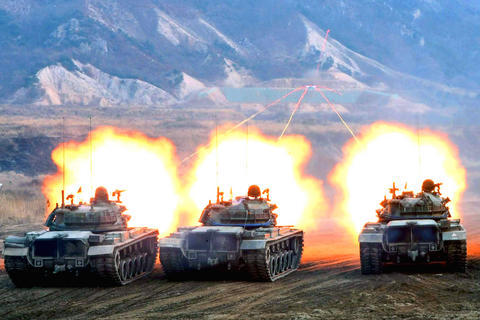North Korea's chronic food shortage has worsened to affect even some of the country's elite citizens in Pyongyang, a South Korean aid group said yesterday.
The communist nation has not given rice rations to medium and lower-level officials living in Pyongyang, the capital city, this month after cutting the rations by 60 percent last month, the Good Friends aid agency said in its regular newsletter.
Pyongyang citizens are considered the most well-off in the isolated, impoverished country, where the government controls most means of production and operates a centralized ration system. Only those deemed most loyal to Kim Jong-il's regime are allowed to live in the capital.

PHOTO: EPA
The food situation is more serious in rural areas, with residents in many regions in the country's South Hwanghae province living without food rations since November, the aid group said.
Some collective farm workers in those regions have not come to work citing the lack of food, and their absence is causing problems with farming preparations in the spring planting season, it said.
Good Friends, a group that sends food and other aid to the North, declined to specify where it had obtained the information, saying it has to protect its informants. Some of the group's previous reports of what was happening inside North Korea have later been confirmed.
The World Food Program has warned that North Korea could face the worst food shortage in years, after severe floods swept through the country last summer, destroying more than 11 percent of the country's crops.
A US State Department humanitarian expert visited South Korea earlier this week to discuss the food situation in North Korea, the US Embassy said.
In Washington, State Department spokesman Tom Casey said on Wednesday that there have been discussions about food aid to the North but that no decision had yet been reached. Casey also reiterated that any US food assistance was unrelated to the ongoing negotiations to persuade North Korea to abandon its nuclear weapons.
North Korea has relied on foreign assistance to feed its 23 million people since the mid-1990s, when its economy was hit by natural disasters coupled with the loss of the regime's Soviet benefactor. As many as 2 million people are believed to have died of famine, exacerbated by a centrally controlled agriculture sector saddled with outdated farming methods.
South Korea was a main food donor for the North when the country was under two successive liberal presidents for the past decade. But conservative South Korean President Lee Myung-bak took office last month with a pledge to stop sending unconditional aid to the North.
Lee has said he would continue humanitarian assistance to North Korea, but would seek to get more in return.
Apparently mindful of the leadership change in the South, the North has not made its annual request for rice and fertilizer this year.

Kehinde Sanni spends his days smoothing out dents and repainting scratched bumpers in a modest autobody shop in Lagos. He has never left Nigeria, yet he speaks glowingly of Burkina Faso military leader Ibrahim Traore. “Nigeria needs someone like Ibrahim Traore of Burkina Faso. He is doing well for his country,” Sanni said. His admiration is shaped by a steady stream of viral videos, memes and social media posts — many misleading or outright false — portraying Traore as a fearless reformer who defied Western powers and reclaimed his country’s dignity. The Burkinabe strongman swept into power following a coup in September 2022

‘FRAGMENTING’: British politics have for a long time been dominated by the Labor Party and the Tories, but polls suggest that Reform now poses a significant challenge Hard-right upstarts Reform UK snatched a parliamentary seat from British Prime Minister Keir Starmer’s Labor Party yesterday in local elections that dealt a blow to the UK’s two establishment parties. Reform, led by anti-immigrant firebrand Nigel Farage, won the by-election in Runcorn and Helsby in northwest England by just six votes, as it picked up gains in other localities, including one mayoralty. The group’s strong showing continues momentum it built up at last year’s general election and appears to confirm a trend that the UK is entering an era of multi-party politics. “For the movement, for the party it’s a very, very big

ENTERTAINMENT: Rio officials have a history of organizing massive concerts on Copacabana Beach, with Madonna’s show drawing about 1.6 million fans last year Lady Gaga on Saturday night gave a free concert in front of 2 million fans who poured onto Copacabana Beach in Rio de Janeiro for the biggest show of her career. “Tonight, we’re making history... Thank you for making history with me,” Lady Gaga told a screaming crowd. The Mother Monster, as she is known, started the show at about 10:10pm local time with her 2011 song Bloody Mary. Cries of joy rose from the tightly packed fans who sang and danced shoulder-to-shoulder on the vast stretch of sand. Concert organizers said 2.1 million people attended the show. Lady Gaga

SUPPORT: The Australian prime minister promised to back Kyiv against Russia’s invasion, saying: ‘That’s my government’s position. It was yesterday. It still is’ Left-leaning Australian Prime Minister Anthony Albanese yesterday basked in his landslide election win, promising a “disciplined, orderly” government to confront cost-of-living pain and tariff turmoil. People clapped as the 62-year-old and his fiancee, Jodie Haydon, who visited his old inner Sydney haunt, Cafe Italia, surrounded by a crowd of jostling photographers and journalists. Albanese’s Labor Party is on course to win at least 83 seats in the 150-member parliament, partial results showed. Opposition leader Peter Dutton’s conservative Liberal-National coalition had just 38 seats, and other parties 12. Another 17 seats were still in doubt. “We will be a disciplined, orderly